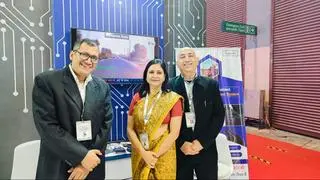The India Innovation Lab for Green Finance recently announced it will assess solutions to financial challenges faced by projects in the ‘green’ space. Backed by the Ministry of New and Renewable Energy, it’s a helpful move aimed at boosting green infrastructure across India.
With clean energy becoming part of the national agenda, the role of large corporations that have pursued carbon neutrality and small entrepreneurs, who have remained active in the green segment in the face of risks, becomes important.
Start-up Island recently discussed Waah!, a venture that seeks to disrupt what its founder calls an “illogical” water industry. Vineets Vats had thought of how to achieve nearly zero distance in logistics, that is, transporting water to reduce environmental damage. Eco Positive, a clean energy start-up, thinks along similar lines by helping clients deal with large amounts of food waste at the source. The company is backed by FutureIP, an incubation and seed investment entity.
Thinking efficiencyDispelling common notions on biogas production, like the smell or mess it involves, Eco Positive’s eco-digester system is an enclosed one. According to Gururaj S Kanade, CEO, Eco Positive, its installations at client locations are never in the way, and no one in its vicinity would imagine it’s a biogas plant.
“It works along the same lines of traditional biogas plants, but we’ve made it more efficient. It optimises on space and the amount of biogas our system generates is more than double that of the earlier mechanisms. It’s economically viable,” says Kanade.
At Jindal Naturecure Institute, Bengaluru, a naturopathy hospital and one of Eco Positive’s clients, the biogas plant is a part of the total effort towards a green campus. “In a day, 3-4 kg of gas is produced out of 30-45 kg of food waste, which gives us 3 or 4 cylinders a month,” says KK Ghosh, Director - Administration, JNI.
He adds that an earlier system hadn’t worked well but he was happy with the biogas system at JNI over the last two years.
Thinking potentialWhile Eco Positive’s Kanade rues a widespread apathy among small to medium-size operators in the F&B sector, where most of the city’s food waste is generated, he lauds the consistent push for green certifications and achievements among some in the corporate sector. He envisions Eco Positive working well in partnership with many CSR initiatives.
“Five star hotels are an opportunity for us. But don’t forget orphanages, educational institutions with hostels and cafeterias attached, and homes for the aged. Imagine the impact if an old age home could collect all the food waste in a locality and use it to generate fuel for its own needs,” he explains.








Comments
Comments have to be in English, and in full sentences. They cannot be abusive or personal. Please abide by our community guidelines for posting your comments.
We have migrated to a new commenting platform. If you are already a registered user of TheHindu Businessline and logged in, you may continue to engage with our articles. If you do not have an account please register and login to post comments. Users can access their older comments by logging into their accounts on Vuukle.